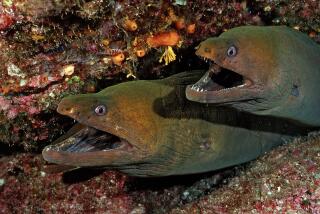What is El Niño bringing us besides rain? Hammerhead sharks, experts say
A possible record-breaking El Niño is attracting dozens of sharks, even hammerheads, off the coast of Southern California, experts say.
The periodic ocean pattern characterized by unusually warm water in the eastern Pacific could cause heavy rain as it heats the atmosphere and changes circulation patterns, according to forecasters. But experts say the weather is drawing dozens of great white sharks and several hammerheads to the coast because their food sources are migrating from more tropical areas, the Huntington Beach Independent reported.
“You’ve got a whole tropical food chain that’s moved into our neighborhood,” said Chris Lowe, a marine biology professor at Cal State Long Beach. “That warm water is bringing that food up here, and that food is being followed by its predators. That’s how we get that subtropical food web that we normally don’t have showing up here.”
Water and Power is The Times’ guide to the drought. Sign up to get the free newsletter >>
Hammerheads are known to visit Southern California waters during El Niño years, he said. Lowe saw them in 1997 during the last El Niño and said some have been found as far north as the Central Coast.
Sightings of the strange-looking creatures have been reported off Southern California for the last two summers. But their numbers have increased as they chase yellowtail and tuna from Central America and Baja California, Lowe said.
A group trying to catch yellowtail off Sunset Beach on Sept. 6 encountered a 10-foot hammerhead that was attracted by chum the group was using. The day before, a kayaker was bitten on the leg by a hammerhead near Malibu.
Lowe, director of Cal State Long Beach’s Shark Lab, has been studying sharks for more than 25 years. He said the warm water has attracted other non-indigenous marine life, such as a whale shark seen off Dana Point, manta rays spotted near Huntington Beach and thousands of tiny pelagic red crabs that washed ashore in Newport Beach.
“It’s a different ocean than we’ve been used to for the last 40 or 50 years,” he said. “Big predators are coming back, and that includes seals, sea lions, sharks and all the things we never had to share the waves with. Now they’re coming back, and we’re going to learn to share.”
The Seal Beach Marine Safety Department, which uses a small drone to look for sharks once a week, hasn’t seen any hammerheads in the area, Marine Safety Chief Joe Bailey said. It hasn’t spotted any great whites in the last two weeks, he said.
Lowe said he and his students have been tracking the movements of six juvenile great white sharks near Surfside in Seal Beach and Sunset Beach in Huntington Beach. They hope to sail out to tag some hammerheads for identification, he said.
Carpio writes for Times Community News.
Twitter: @acocarpio
ALSO:
California fire updates: Valley fire has grown, but rain has come
Flights canceled, delays reported at Ontario airport after power outage
L.A. renters, landlords should split cost of quake retrofitting equally, housing officials say
More to Read
Sign up for Essential California
The most important California stories and recommendations in your inbox every morning.
You may occasionally receive promotional content from the Los Angeles Times.










